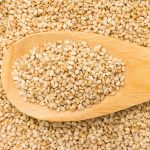 Before 1785, English authors spelt the word sesame in a variety of ways, ranging from sysane, to sesama, to sesamo, to sesamy; after 1785, every English author spelt the word as we do, sesame. The almost instantaneous agreement on the spelling of the word was caused by the publication, in that year, of a translation of The Arabian Nights, a collection of two hundred Middle Eastern tales. The best known of those tales, Ali Baba and the Forty Thieves, is the one in which Ali Baba discovers the thieves’ magic password, Open sesame. So popular was this translation of the tale that it settled once and for all the English spelling of the tiny seed’s name. In origin, the word sesame, which first appeared in English in the mid fifteenth century, derives from the Greek name of the seed, sesamon.
Before 1785, English authors spelt the word sesame in a variety of ways, ranging from sysane, to sesama, to sesamo, to sesamy; after 1785, every English author spelt the word as we do, sesame. The almost instantaneous agreement on the spelling of the word was caused by the publication, in that year, of a translation of The Arabian Nights, a collection of two hundred Middle Eastern tales. The best known of those tales, Ali Baba and the Forty Thieves, is the one in which Ali Baba discovers the thieves’ magic password, Open sesame. So popular was this translation of the tale that it settled once and for all the English spelling of the tiny seed’s name. In origin, the word sesame, which first appeared in English in the mid fifteenth century, derives from the Greek name of the seed, sesamon.
Sesame, an herbaceous plant extensively cultivated in the Orient, holds great culinary significance. The seeds of this plant find application in the creation of cakes and confectionery, adding a distinct flavor and texture. Additionally, the oil derived from sesame seeds is highly prized as a versatile flavoring agent, enhancing the taste of both sweet and savory dishes alike.
